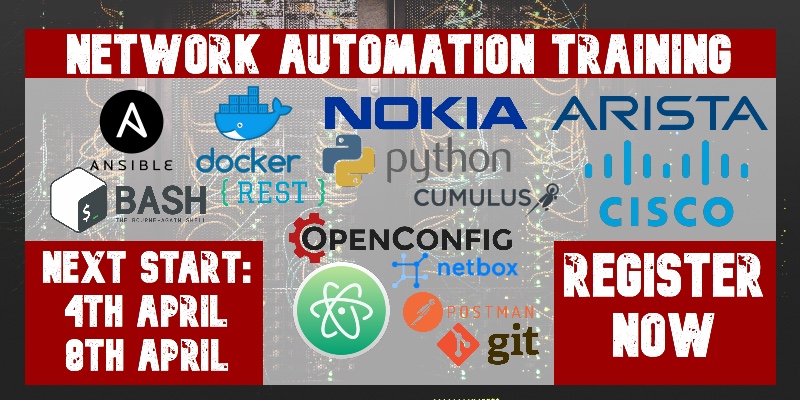Daily Roundup: IBM Leads White House HPC Group as Big Tech Battles COVID-19
Cisco pledged $225 million as IBM took charge of White House HPC group as big tech continues to...
IETF 107 Starts Today as a Virtual Meeting

Later today, the 107th meeting of the Internet Engineering Task Force (IETF) will begin its working group sessions in an unconventional way. Previously, over 1,000 engineers were expected to be in Vancouver, Canada, to engage in the IETF’s work creating the open standards that make the Internet possible.
But with the global COVID-19 pandemic, the IETF leadership decided to cancel the in-person meeting in Vancouver. Instead a scaled-down, completely virtual meeting will take place. Only 12 of the IETF’s 115+ working groups will be meeting this week. Other working groups, and the research groups of the Internet Research Task Force (IRTF) may schedule interim meetings in the weeks and months ahead.
You can participate remotely in IETF 107. The steps are all outlined in this “Guide for IETF 107 Participants“. Useful resources include:
- IETF 107 Agenda
- IETF 107 Materials (slides, links to drafts)
To be clear, most of the work of the IETF in creating the Internet’s open standards ALREADY takes place online. People create “Internet-Draft” documents that propose new ways to make the Internet work better. Those documents are discussed and debated on email lists for working groups. Eventually those working groups reach “rough consensus” and Continue reading
Tech Bytes: Getting Visibility Into The End User Experience With AppNeta (Sponsored)
AppNeta combines path, packet, Web, and flow data to provide a detailed picture of end user performance. In this sponsored Tech Bytes episode, we discuss how AppNeta works, how performance visibility can help organizations move from fighting fires to proactive remediation, the value of synthetic transactions, and more. Our guests from AppNeta are John Tewfik, Principal Solutions Consultant; and Alec Pinkham, Director of Product Marketing.Tech Bytes: Getting Visibility Into The End User Experience With AppNeta (Sponsored)
AppNeta combines path, packet, Web, and flow data to provide a detailed picture of end user performance. In this sponsored Tech Bytes episode, we discuss how AppNeta works, how performance visibility can help organizations move from fighting fires to proactive remediation, the value of synthetic transactions, and more. Our guests from AppNeta are John Tewfik, Principal Solutions Consultant; and Alec Pinkham, Director of Product Marketing.
The post Tech Bytes: Getting Visibility Into The End User Experience With AppNeta (Sponsored) appeared first on Packet Pushers.
Network Break 276: Cisco Extends Certification Renewals; EU Asks Streaming Services To Reduce Bandwidth
On today's Network Break we check in on the health of the global Internet as more and workers go remote, Cisco extends the lifetime of professional certs, the EU asks streaming services to throttle back on bandwidth, some debt-laden tech companies see share prices plunge, and more.
The post Network Break 276: Cisco Extends Certification Renewals; EU Asks Streaming Services To Reduce Bandwidth appeared first on Packet Pushers.
Network Break 276: Cisco Extends Certification Renewals; EU Asks Streaming Services To Reduce Bandwidth
On today's Network Break we check in on the health of the global Internet as more and workers go remote, Cisco extends the lifetime of professional certs, the EU asks streaming services to throttle back on bandwidth, some debt-laden tech companies see share prices plunge, and more.Cato Bolsters SASE-Based SDP to Serve Remote Workers
The vendor said the SASE architecture promises less complexity, shorter deployment times, improved...
Networks Absorb Annual Traffic Spike in a Week
This rapid shift in usage, behavior, and daily activity around the world is causing...
SwiftStack Deploys Scalable Telecom Data Platform with Dell Technologies
SwiftStack’s data platform uses a combination of software-defined architecture engineered for the...
Cisco CEO Commits $225 Million to Fight COVID-19
This includes $8 million in cash, $210 million in products, and up to $5 million in grants and...
White House, IBM-Led Group Offer HPC Resources in COVID-19 Fight
The IBM-led group includes Amazon Web Services, Microsoft, Google, and Hewlett Packard...
The Week in Internet News: Online Story Time in the Age of Social Distance

Connecting online: Many libraries and authors are offering online reading sessions during recommended social distancing due to the spreading coronavirus, says Timeout.com. The article offers a list of online reading activities.
WiFi on the bus: The Charleston County School District is deploying WiFi enabled buses across its school district to bring Internet service to students stuck at home because of coronavirus-related school closings, Live5news.com reports. The WiFi on the buses has a range of up to 150 feet.
Addressing access: Other organizations are taking several steps to help students and other people who don’t have Internet access while away from school or work. Several Internet service providers are providing free WiFi service for several weeks, Boston.com reports. Boston Public Schools are also offering computers and Internet access to students. In addition, several Internet and cable companies are promising to not cut off access for unpaid bills, BangorDailyNews.com reports.
Fake virus news: Twitter will be removing harmful news related to the coronavirus outbreak, TheGuardian.com reports. Among the tweets it will remove: Denial of health authority recommendations “with the intent to influence people into acting against recommended guidance,” like encouraging people not to socially distance themselves. Also, Continue reading
Deploying security.txt: how Cloudflare’s security team builds on Workers


When the security team at Cloudflare takes on new projects, we approach them with the goal of achieving the “builder first mindset” whereby we design, develop, and deploy solutions just as any standard engineering team would. Additionally, we aim to dogfood our products wherever possible. Cloudflare as a security platform offers a lot of functionality that is vitally important to us, including, but not limited to, our WAF, Workers platform, and Cloudflare Access. We get a lot of value out of using Cloudflare to secure Cloudflare. Not only does this allow us to test the security of our products; it provides us an avenue of direct feedback to help improve the roadmaps for engineering projects.
One specific product that we get a lot of use out of is our serverless platform, Cloudflare Workers. With it, we can have incredible flexibility in the types of applications that we are able to build and deploy to our edge. An added bonus here is that our team does not have to manage a single server that our code runs on.
Today, we’re launching support for the security.txt initiative through Workers to help give security researchers a common location to learn about how Continue reading
OMG: What Is Layer-2
Found this “gem” describing the differences between layer-2 and layer-3 on an unnamed $vendor web site.
Layer 2 is mainly concerned with the local delivery of data frames between network devices on the same network or local area network (LAN).
So far so good…
CEX (Code EXpress) 08. Conditionals and wishes.
Hello my friend,
In the previous blogpost we’ve started the discussion about the instructions, which yo need to know in order to create a Python’s code. Namely, we you have learned how to create and use for loops for the Python’s lists and dictionaries. Today you will learn how to create conditionals.
Network automation training – boost your career
Don’t wait to be kicked out of IT business. Join our network automation training to secure your job in future. Come to NetDevOps side.

How does the training differ from this blog post series? Here you get the basics and learn some programming concepts in general, whereas in the training you get comprehensive set of knowledge with the detailed examples how to use Python for the network and IT automation. You need both.
What are we going to do today?
Together with the the loops, the conditionals create a basis of almost each and every script. You would use them, when you need to make a decision about an action you code should execute, when there are multiple actions available and they are dependent in some facts. Therefore, you will learn:
- How to create a conditional instruction using if .. elif .. else .. Continue reading
ipSpace.net Blog Now Runs on Hugo
Years ago I figured out that I’d eventually have to migrate my blog from Blogger to something more independent, and based on my previous experience with Wordpress I wasn’t exactly enthusiastic to go down that path.
In 2015 I’ve seen Scott Lowe going from Wordpress to Jekyll and then to Hugo, and decided it might make sense to recreate ipSpace.net blog with a tool that generates static web pages… but never found the time to do it.
MUST READ: Meaningful Availability
Defining service availability using the famous X nines (and all the hacks like “planned downtime doesn’t count”) is pretty useless in a highly distributed system where the only thing that really matters is the user experience, not ping response times. One should ask what precisely should we be measuring, and how could we make sure we can act on the measurements
More details in a concise analysis of the Meaningful Availability paper by the one-and-only The Morning Paper.
MUST READ: Meaningful Availability
Defining service availability using the famous X nines (and all the hacks like “planned downtime doesn’t count”) is pretty useless in a highly distributed system where the only thing that really matters is the user experience, not ping response times. One should ask what precisely should we be measuring, and how could we make sure we can act on the measurements
More details in a concise analysis of the Meaningful Availability paper by the one-and-only The Morning Paper.